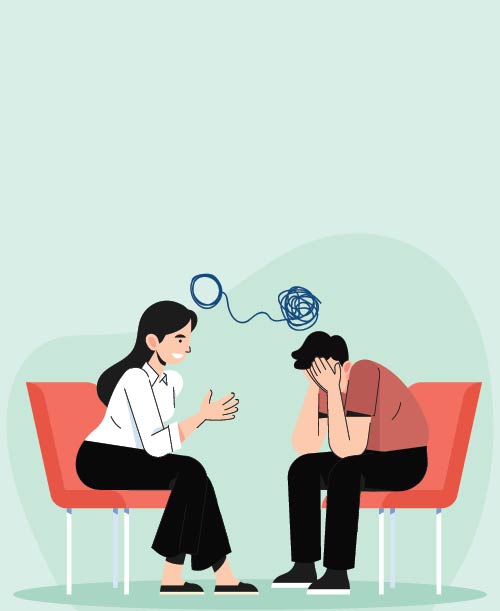Opening the Tricks of Mental Health And Wellness: An Introduction of Therapy and Treatment Alternatives
Mental health and wellness is a complex and important facet of overall wellness. Numerous therapy and treatment choices exist to address different emotional obstacles. Each strategy uses one-of-a-kind advantages and techniques tailored to private demands. Comprehending these options is vital for anybody looking for to enhance their psychological health. Cognitive Behavioural Therapy. What factors should one take into consideration when discovering these avenues? The response may reveal a course to a much healthier psychological state
Understanding Mental Wellness and Its Importance
Mental wellness incorporates the psychological, psychological, and social well-being of people, considerably influencing how they believe, feel, and act. Its value can not be overstated, as it influences every element of life, including partnerships, job performance, and total quality of life. Individuals with excellent psychological wellness tend to deal with stress and anxiety better, preserve healthier partnerships, and make notified decisions. Conversely, inadequate psychological wellness can cause psychological distress, damaged functioning, and different mental illness, which may call for specialist treatment. Comprehending psychological wellness is vital for acknowledging the indicators of distress and the requirement for assistance. Understanding likewise promotes empathy and reduces preconception, urging people to look for aid when needed. By focusing on mental health and wellness, communities can cultivate settings that support psychological wellness, eventually bring about healthier, much more resilient people. This foundation serves as a crucial action towards reliable mental wellness therapy and therapy alternatives.
Kinds Of Counseling Techniques
Therapy approaches differ extensively, each tailored to fulfill the one-of-a-kind demands of individuals seeking support. Amongst the most typical types are cognitive-behavioral therapy (CBT), which concentrates on determining and changing negative thought patterns, and person-centered treatment, which stresses empathy and approval. Psychodynamic therapy explores subconscious processes and past experiences to understand existing habits, while solution-focused quick therapy aims to determine remedies as opposed to examine problems.Additionally, family treatment addresses relational characteristics and communication within households, fostering healthier interactions. Group counseling gives a public area for individuals to share experiences and sustain one an additional. Other approaches consist of existential treatment, which urges people to discover definition and function, and art or music therapy, which utilizes innovative expression as a restorative tool. Each strategy provides distinct methods and approaches, enabling clients to locate one of the most appropriate approach for their individual development and recovery trips.
Checking Out Different Therapy Techniques
In the domain name of psychological wellness therapy, numerous therapy methods supply unique techniques to therapy. Cognitive Behavior modification emphasizes the connection in between thoughts and habits, while Psychodynamic Therapy explores unconscious influences on psychological well-being. In Addition, Mindfulness-Based Techniques advertise present-moment recognition as a means to enhance psychological guideline and total mental health.
Cognitive Behavior Treatment
Cognitive Behavior Modification (CBT) stands apart as one of one of the most commonly exercised and researched techniques in mental wellness therapy. This approach focuses on the affiliation between behaviors, sensations, and thoughts, stressing that altering unfavorable idea patterns can result in improved psychological health and behavior modifications. CBT is structured, normally involving a restricted variety of sessions, and intends to equip individuals with functional abilities to handle their symptoms. It works for a variety of conditions, consisting of anxiety problems, anxiety, and trauma. By making use of techniques such as cognitive restructuring and direct exposure therapy, CBT fosters resilience and encourages customers to challenge challenges head-on, making it a beneficial choice in the landscape of psychological health therapies.
Psychodynamic Treatment Approaches
Psychodynamic treatment approaches use a deep expedition of the subconscious mind and its impact on habits and psychological health. Rooted in Freudian concept, these techniques stress the significance of very early childhood experiences and unconscious problems. With methods such as complimentary association, desire evaluation, and transference, people get understanding right into their sensations and ideas, fostering self-awareness and understanding. This healing modality urges clients to uncover quelched emotions and unsolved issues, which can be crucial in addressing current emotional obstacles. By examining the interaction in between existing behaviors and previous experiences, psychodynamic therapy intends to promote psychological recovery and personal development. Inevitably, it provides a structure for people to explore intricate internal dynamics that influence their psychological health.

Mindfulness-Based Methods
While traditional therapies typically concentrate on past experiences, mindfulness-based strategies focus on present-moment awareness as a path to psychological well-being. These approaches, including mindfulness-based cognitive therapy (MBCT) and mindfulness-based anxiety decrease (MBSR), urge individuals to engage completely with their thoughts and feelings without judgment. Experts discover to observe their mental states, promoting a greater understanding of psychological triggers and reactions. This practice not only eases signs of stress and anxiety and clinical depression yet additionally improves total mental resilience. By incorporating mindfulness workouts, such as reflection and deep breathing, customers grow a sense of peace and quality. Ultimately, mindfulness-based strategies equip people to navigate life's difficulties with boosted awareness and approval, advertising a healthier relationship with their ideas and emotions.
The Role of a Therapist or Counselor
A skilled therapist or counselor plays an essential duty in sustaining people via their mental wellness journeys. They offer a secure, non-judgmental space where clients can reveal their feelings and ideas honestly. Cognitive Behavioural Therapy. By using different healing techniques customized to every individual's needs, therapists help customers discover underlying concerns that might add to their mental wellness challenges.Therapists offer assistance and devices to deal with stress and anxiety, anxiety, clinical depression, and other emotional troubles. Their training furnishes them to identify patterns in habits and thought processes, helping with insights that lead to personal development. They additionally promote a solid healing alliance, which is vital for effective outcomes.Moreover, therapists continue to be dedicated to discretion and honest criteria, ensuring a relying on atmosphere. Inevitably, the role of a therapist or therapist is to empower individuals, urging them to establish strength and much healthier coping methods while guiding via life's intricacies
Just how to Select the Right Counseling or Treatment Choice
Picking the appropriate counseling or therapy option begins with reviewing private requirements. It is important to recognize individual difficulties and objectives before discovering numerous therapy designs. This fundamental action can greatly influence the performance of the selected strategy.
Examine Your Demands

Exactly how can people efficiently evaluate their psychological health and wellness needs when reviewing counseling Continued or treatment options? They ought to reflect on their emotional state and determine details concerns, such as stress and anxiety, partnership, or anxiety obstacles. Journaling can be a useful device for tracking thoughts and sensations over time. In addition, people may take advantage of seeking comments from relied on friends or relative pertaining to perceived adjustments in behavior or state of mind. It is also valuable to evaluate personal objectives for treatment, such as enhancing coping skills or acquiring insight right into individual patterns. Investigating numerous counseling techniques and their viability for specific needs can aid in making an informed choice. Ultimately, self-awareness plays a pivotal role in selecting the best course for mental health support.
Discover Therapy Styles
While going across the diverse landscape of therapy options, people should take into consideration numerous designs of counseling to locate the best suitable for their distinct requirements. Cognitive Behavior Therapy (CBT) concentrates on altering unfavorable thought patterns, while Psychodynamic Treatment checks out previous experiences and subconscious processes. Humanistic methods emphasize individual growth and self-actualization, promoting a helpful environment. In addition, mindfulness-based treatments cultivate present-moment awareness, helping emotional regulation. For those seeking framework, Solution-Focused Short Treatment targets particular objectives and remedies. Group treatment offers a common setup for shared experiences and support. Eventually, people ought to review their preferences, convenience degrees, and certain difficulties, ensuring they pick a restorative style that resonates with their personal trip toward mental health.
Getting Over Obstacles to Seeking Assistance

The Benefits of Therapy and Therapy for Mental Health
Seeking assistance for mental health difficulties can result in substantial renovations in overall wellness. Counseling and treatment provide people with a safe room to explore their ideas and sensations, cultivating self-awareness and personal development. These professional solutions equip customers with dealing strategies and problem-solving skills customized to their special situations.Moreover, treatment can lower symptoms of stress and anxiety, depression, and other mental wellness conditions, enhancing psychological durability. Normal sessions advertise accountability and motivate people to set and achieve individual objectives. Via various healing modalities, such as cognitive-behavioral therapy or mindfulness techniques, clients find out to reframe adverse ideas and develop much healthier behaviors.Additionally, the therapeutic partnership itself can be a resource of assistance, aiding to fight isolation and isolation. Generally, participating in counseling and treatment is an aggressive step toward achieving psychological health, allowing individuals to lead more meeting lives.
Frequently Asked Questions
How Much Time Does Counseling or Therapy Normally Last?
The duration of therapy or treatment varies considerably, typically lasting from a few sessions to numerous months or years. Elements affecting this consist of the person's details demands, the sort of therapy, and healing objectives.
What Should I Expect During My Very First Session?
During the very first session, people can expect important site an intro, conversation of problems, and the therapist's strategy. They might complete analyses and develop goals, cultivating a secure setting for open interaction and building relationship.

Exist Any Type Of Risks Connected With Treatment?
Treatment can include risks, such as emotional discomfort, susceptability, or facing uncomfortable memories. While these difficulties might emerge, they can also cause personal growth and recovery, making the healing process complicated yet potentially fulfilling.
How Can I Tell if My Specialist Is a Good Fit?
Figuring out if a therapist is a good fit includes evaluating comfort, communication design, and therapeutic approach. Positive relationship and progression towards goals are indications of a suitable match, vital for reliable psychological health support.
Will My Insurance Policy Cover Counseling or Treatment Procedure?
Figuring out insurance protection for counseling or treatment sessions commonly calls for calling the more information insurance coverage supplier straight. Plans vary significantly, so individuals should verify benefits, co-pays, and any kind of essential pre-approvals prior to going after therapy solutions. Among the most common kinds are cognitive-behavioral therapy (CBT), which concentrates on recognizing and altering negative thought patterns, and person-centered therapy, which stresses compassion and approval. Psychodynamic therapy checks out unconscious processes and previous experiences to comprehend present habits, while solution-focused short treatment aims to recognize options rather than investigate problems.Additionally, household treatment addresses relational dynamics and communication within families, fostering much healthier communications. Other strategies include existential therapy, which motivates people to discover definition and objective, and art or songs treatment, which utilizes creative expression as a therapeutic tool. Cognitive Behavioral Treatment stresses the connection between habits and ideas, while Psychodynamic Treatment checks out unconscious impacts on psychological wellness. Cognitive Behavior Therapy (CBT) focuses on changing unfavorable thought patterns, while Psychodynamic Treatment explores past experiences and unconscious processes.